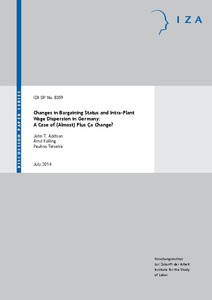Changes in bargaining status and intra-plant wage dispersion in Germany: a case of (almost) plus ça change?
"Recent studies have pointed to the association between declining collective bargaining coverage and rising overall wage inequality. This association holds more or less across-the-board, at least for broad swathes of recent history. That said, the exact contribution of deununionization is a mat...
| Main Authors: | , , |
|---|---|
| Institution: | ETUI-European Trade Union Institute |
| Format: | TEXT |
| Language: | English |
| Published: |
Bonn
2014
IZA |
| Subjects: | |
| Online Access: | https://www.labourline.org/KENTIKA-19118198124919363709-Changes-in-bargaining-status-a.htm |
| Summary: | "Recent studies have pointed to the association between declining collective bargaining coverage and rising overall wage inequality. This association holds more or less across-the-board, at least for broad swathes of recent history. That said, the exact contribution of deununionization is a matter of debate, perhaps no more so than in Germany, our case study. The present paper takes a less conventional approach to this particular source of rising inequality by examining intra-plant wage dispersion in the wake of establishments either exiting from or entering into collective agreements. Several measures of inequality are constructed for German establishments over the twelve-year period 1996-2008, an interval of continuously declining union representation. Using linked employer-employee data, our estimation strategy hinges upon the identification of comparable groups of establishments and on both instantaneous and medium- to long-term changes in the wage structure. A modest widening effect on dispersion of exiting from a sectoral agreement is detected in the data once we effect a comparison across observationally-equivalent individuals. The converse does not apply in respect of joiners. The scale of the former effect casts doubt on some of the more exaggerated claims of the importance of deunionization to wage inequality and the resurgence of Germany more generally." |
|---|---|
| Physical Description: | 33 p. Digital |

